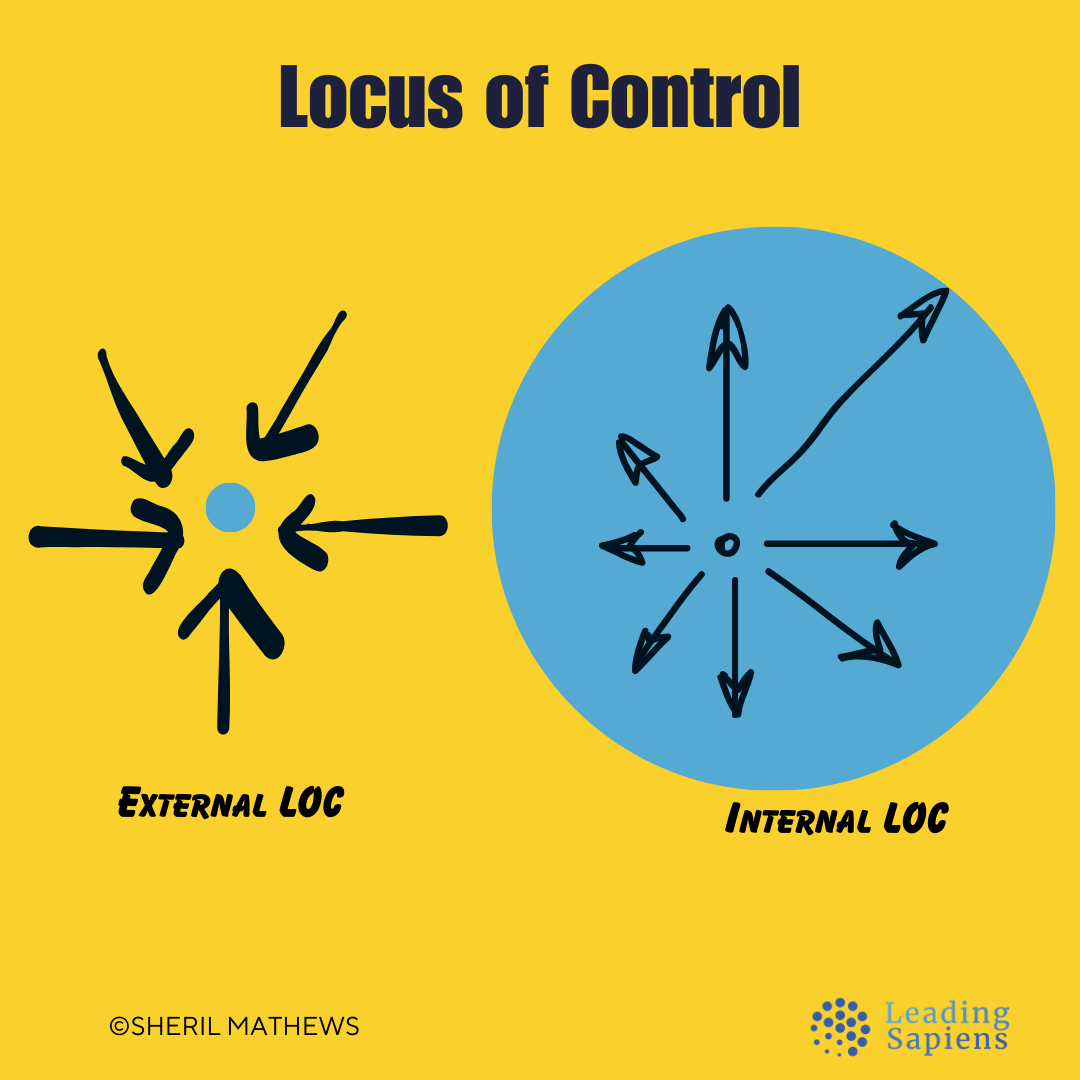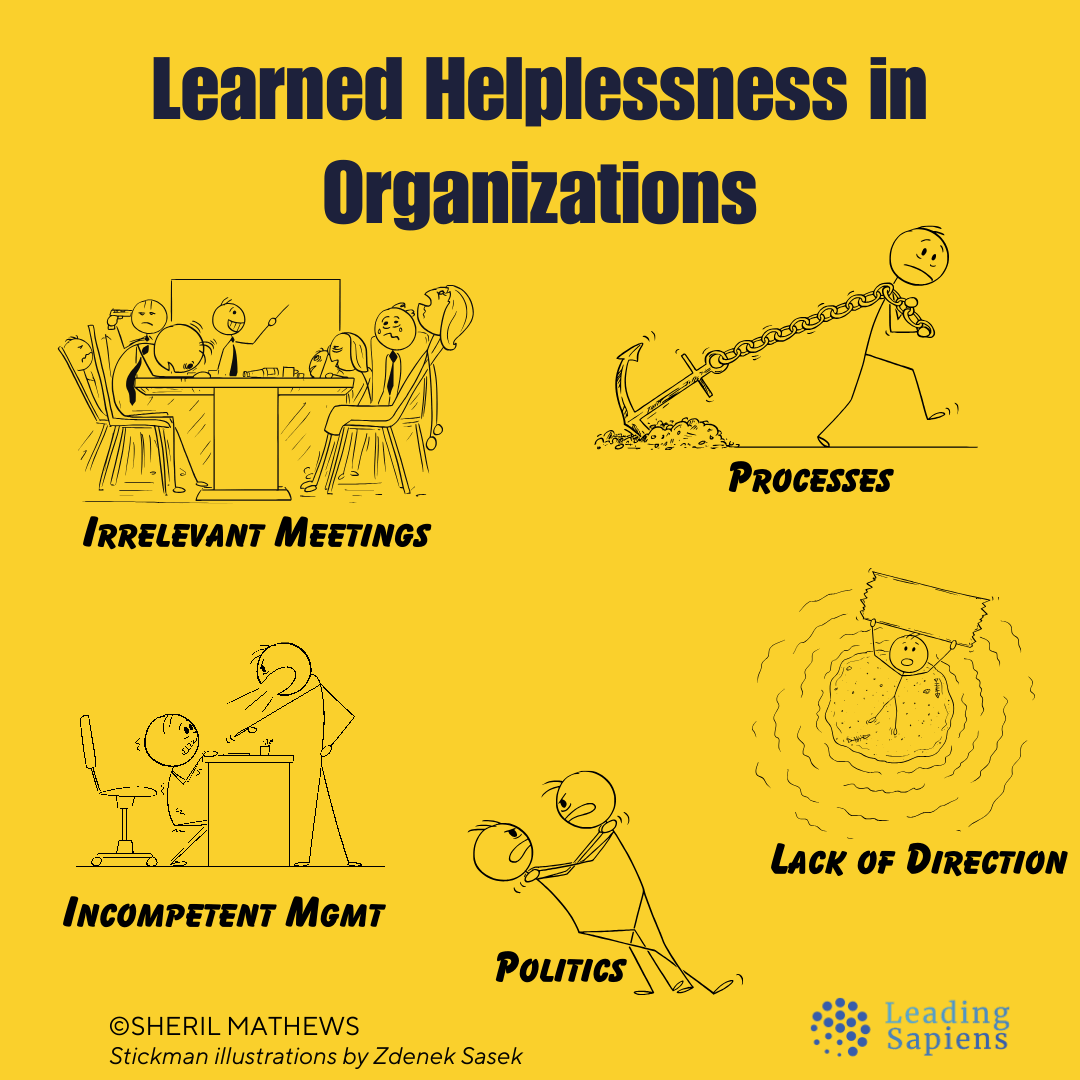Locus of control refers to how we view circumstances in terms of the amount of control we have over situations and the experiences that affect us. I look at locus of control specifically in the context of leadership and management: how locus of control impacts leadership performance, and how it plays into learned helplessness in organizations.
What is locus of control
Julian Rotter's concept of locus of control (LOC) describes our perception of the influences that impact life and work, and has been extensively examined in thousands of studies.
Those with a high internal locus of control believe they're primarily responsible for outcomes in their life. In contrast, those with a high external locus of control believe outside forces like fate, chance, external influences, and other people are chiefly responsible for your outcomes.
Put simply, it's the extent to which someone believes they are in control of their environment, experiences, and outcomes.
Locus of control influences how we perceive and respond to changes and challenges in our environment. An internal locus of control leads to self-attribution for outcomes, while an external locus of control attributes outcomes to external factors.
How we process events and occurrences shapes the perception of our ability to master destiny (internal LOC) or succumb to external forces like luck or fate (external LOC). Ultimately, LOC affects self-efficacy and consequently, self-esteem.
Psychologists categorize people into two groups:
- those with an external locus of control (externals)
- those who have primarily an internal locus of control (internals)
Internals see themselves as agents with the power to determine outcomes, whereas externals believe their actions have no bearing on results.
Internals have a high degree of motivation while externals have a low level of motivation. This makes sense. If you thought things were not necessarily in your control, it's logical not to put great effort.
Let’s take a closer look at the differences.
Internal locus of control
Individuals with an internal locus of control believe their actions directly impact their outcomes. People with a high internal locus of control (internals):
- Accept responsibility for their actions and believe they control their own fate.
- Are proactive in addressing issues.
- Are determined to overcome challenges.
- Actively initiate and manage personal change.
- Do not wait for external triggers to make necessary life changes.
- View change positively as a challenge and opportunity for further development.
- Tend to be more achievement-oriented.
- Exhibit independence, self-confidence, and self-control.
- Are less prone to anxiety, more proactive, and innovative.
- Show a strong sense of commitment to self and are vigorous towards shaping their environment.
External locus of control
Those with an external locus of control attribute outcomes to external factors such as fate, luck, or other people. People with an external locus of control (externals):
- Blame external forces for their circumstances.
- Attribute their successes to luck.
- Feel powerless in challenging situations.
- Prefer more directive, hands-on supervision.
- Are more passive toward change, seeing it as a threat rather than an opportunity.
- Are more likely to experience depressive reactions due to a lack of control.

Locus of Control and Learned Helplessness in Organizations
At first blush, the LOC construct seems to be straightforward and somewhat obvious. Anyone with an external locus of control will struggle to stand out in today’s work environment, and it’s clearly a requirement to get anything done.
However, there’s a second-order dynamic that I have noticed. Once you’ve spent enough time in organizations, I’ve seen folks go from an internal to an external locus of control in the context of their ability to get things done in a large organization.
Sometimes called learned helplessness in organizations, it's the feeling of a lack of agency and victimhood due to the inability to effect change in an organization. It’s caused by a shift in the locus of control from internal to external.
What is organizational helplessness? It’s typically characterized by:
- incapacity to get things done at the organizational level
- stifling bureaucracy
- political machinations that kill initiative
- blaming others or external factors for failure
- inability to make a positive impact or to make a difference
- slow pace of change, or the complete lack of it
- too many demands without clear direction or context
Once people think their actions lead to nowhere, their LOC starts shifting from internal to external. Many folks start out as internals, but over time adopt an external locus of control due to their frustration with organizations.
In contrast, people who maintain an internal locus of control are more likely to show agency and deploy tactics to fight organizational helplessness and build their organizational savvy. They are more likely to engage in “political” behavior, while externals are less likely to do so.

Locus of Control in Leadership
From a leadership perspective, there are two aspects of locus of control:
- how LOC affects leaders individually
- how leaders’ actions and disposition influences their team and organization's locus of control
LOC and leaders at the individual level
A key dynamic of leadership is having to deal with increasing complexity and ambiguity, especially as managers rise through the ranks. Paradoxes, contradictions, and politics become the name of the game. Whether this takes a toll on managers depends to a large extent on their locus of control.
The impact of locus of control on management and leadership effectiveness has been extensively studied. Below are some findings [2, 5]:
- Internals fare better in coping with the day-to-day stress and demands of leadership roles. They’re also less vulnerable to the strain of their jobs.
- Companies led by CEOs with an internal locus of control were more likely to survive tough times compared to those led by externals.
- Individuals with an internal locus of control are more effective in leadership roles.
- Transformational leaders are often found to have an internal locus of control.
- Internals are more capable of influencing openly, pursuing innovative strategies, and achieving higher company performance.
- Individuals with an internal locus of control tend to have more positive work-related outcomes such as job satisfaction, health, and career mobility.
- Internal locus of control is associated with higher effectiveness in leadership, better group performance, and entrepreneurial activity.
- Groups led by individuals with an internal locus of control perform better than those led by individuals with an external locus of control.
- Internals tend to outperform externals in stressful situations and are more involved in entrepreneurial activities.
The caveat is that hard driving internal oriented leaders also have challenges in accepting feedback and complying with external directives.
How leaders affect their team's locus of control
Another key aspect of leadership is whether your actions shift the team’s LOC from an internal to external orientation.
Managers significantly influence locus of control within their teams, which affects how team members perceive their ability to influence outcomes and handle challenges.
Consider the following:
- Autonomy. Does the manager encourage responsibility and autonomy, or is everything tightly controlled?
- Decision-making. Are team members empowered to make decisions, or is this left to external meddling?
- Problem-solving. Is it primarily reactive, or is it proactive? Do leaders delve in the problems, or do they help in setting the problem itself?
- Accountability. Is there a high degree of personal and collective accountability, or is it about shifting the blame, or attributing failure to external factors?
- Motivation. Do the organization's systems drive personal growth and achievement, or do they rely on external rewards and punishment?
- Adaptability. Do managers help develop resilience, or do their behaviors create resistance and passivity?
- Performance. Are incentives clearly linked to performance and outcomes? Are promotions transparent and logical, or are they seen as random and based on who one knows?
Whether your leadership creates an internal or external locus of control has a lot to do with how well you set the context. Below are some additional articles that go into various aspects of context:
- Why context matters in leadership
- Why Netflix emphasizes context
- Why leaders keep ignoring context
- How framing create psychological safety
- Defining a problem is very different from problem-solving
- Creative versus controlling leaders
- Aristotle's Ethos, Pathos, and Logos in modern leadership
Further Reading
- Courage plays a key role in how leaders engage with their ongoing challenges. And it's a different form of courage than how we typically understand it.
- Another psychological concept leaders have to be aware of is cognitive distortions. Clear thinking is a premium when you're operating in high stress, low information environments.
- Locus of control is a key aspect of what can be called leadership metacognition.
Sources
- Rotter, J. B. (1966). Generalized expectancies for internal versus external control of reinforcement. Psychological Monographs: General and Applied, 80(1), 1–28. https://doi.org/10.1037/h0092976
- Developing Management Skills by David A Whetten, Kim S Cameron
- Beyond Performance by Scott Keller, Colin Price
- Why Zebras Don’t Get Ulcers by Robert Sapolsky
- Choice or Chance by Stephen Nowicki
- The Psychology of Executive Coaching by Bruce Peltier
- Kets de Vries, M.F.R., Zevadi, D., Noel, A., and Tombak, M. (1989). ‘Locus of control and entrepreneurship: A three-country comparative study,’ INSEAD Working Paper.
